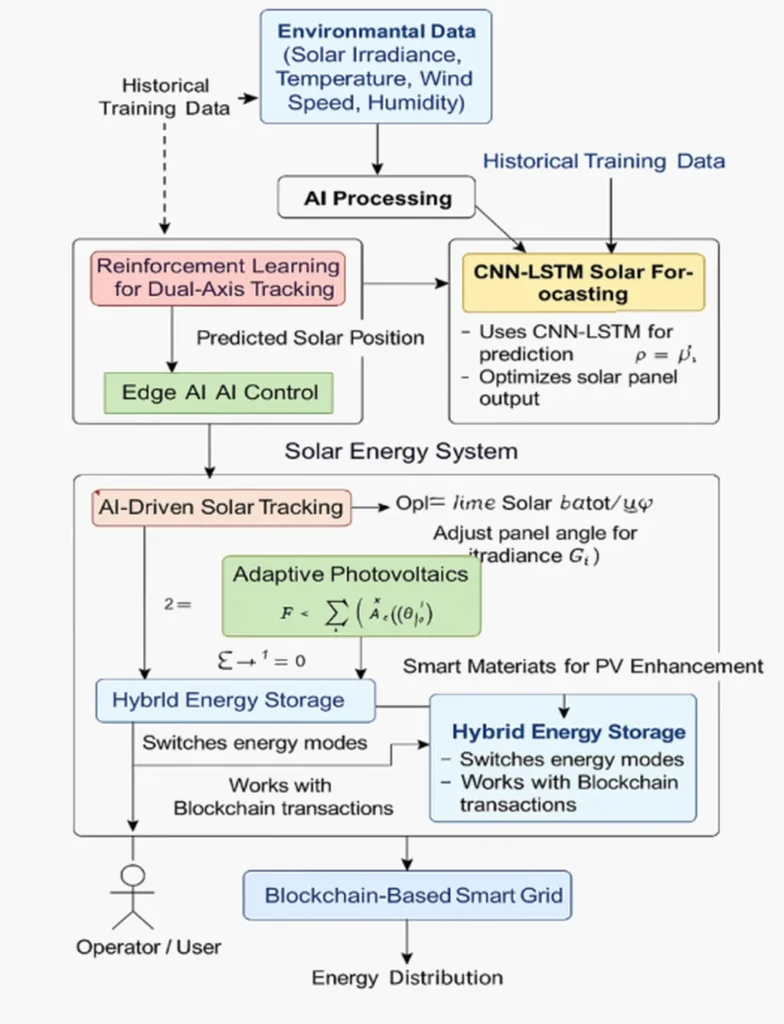In a groundbreaking development for the energy sector, researchers have unveiled an intelligent, AI-driven framework designed to optimize hybrid energy systems, potentially revolutionizing how we manage and distribute power. The study, published in the journal “MethodsX” (translated from the original title), introduces a multi-layered approach that integrates various AI techniques to enhance the performance of grid-tied solar PV-fuel cell hybrid energy systems.
At the heart of this innovation is a sophisticated architecture that combines several advanced AI models. Reinforcement Learning-Driven Evolutionary Neural Networks (RL-ENN) enable real-time adaptive energy dispatch strategies, minimizing the Net Present Cost (NPC) and Cost of Energy (COE). Transformer-Based Spatiotemporal Forecasting (T-STFREP) ensures accurate forecasting of temporal sequences, while Federated Learning-Based Distributed Optimization (FL-DEO) allows for decentralized optimization without compromising data privacy. Graph Neural Networks Power Router (GNN-HSCO) considers hybrid networking as energy graphs to reduce transmission losses, and Quantum-Inspired Generative Adversarial Networks (Q-GAN-ESO) generate synthetic degradation scenarios for optimal energy storage management.
The lead author, Prashant Nene from the Department of Electrical and Electronics Engineering at Oriental University in Indore, India, explains the significance of this research: “Our framework represents a paradigm shift in energy management. By integrating these advanced AI techniques, we can achieve unprecedented levels of efficiency and cost-effectiveness in hybrid energy systems.”
The proposed model has demonstrated remarkable improvements over traditional optimization methods like Genetic Algorithms and Particle Swarm Optimization. Simulations using MATLAB/Simulink and Python with TensorFlow, along with a 30-year evaluation of meteorological data, revealed a 27.5% decrease in NPC, an 18.2% reduction in COE, and a 30.2% increase in battery life. These results underscore the potential of the framework to significantly enhance the performance of smart grid systems.
The commercial implications of this research are substantial. As the energy sector increasingly turns to renewable sources, the need for efficient and scalable energy management solutions becomes paramount. The proposed framework offers a real-time, privacy-preserving, and scalable solution that can be deployed in large-scale smart grid systems. This could lead to more reliable and cost-effective energy distribution, benefiting both energy providers and consumers.
Prashant Nene further elaborates on the future prospects: “This research paves the way for more intelligent and adaptive energy systems. The integration of AI techniques allows for continuous learning and optimization, ensuring that our energy infrastructure can keep pace with the growing demand for sustainable and efficient power solutions.”
The study’s findings not only validate the effectiveness of the proposed framework but also highlight the potential for further advancements in the field. As AI technologies continue to evolve, the integration of these techniques into energy systems could lead to even greater efficiencies and innovations. This research marks a significant step forward in the quest for a smarter, more sustainable energy future.

